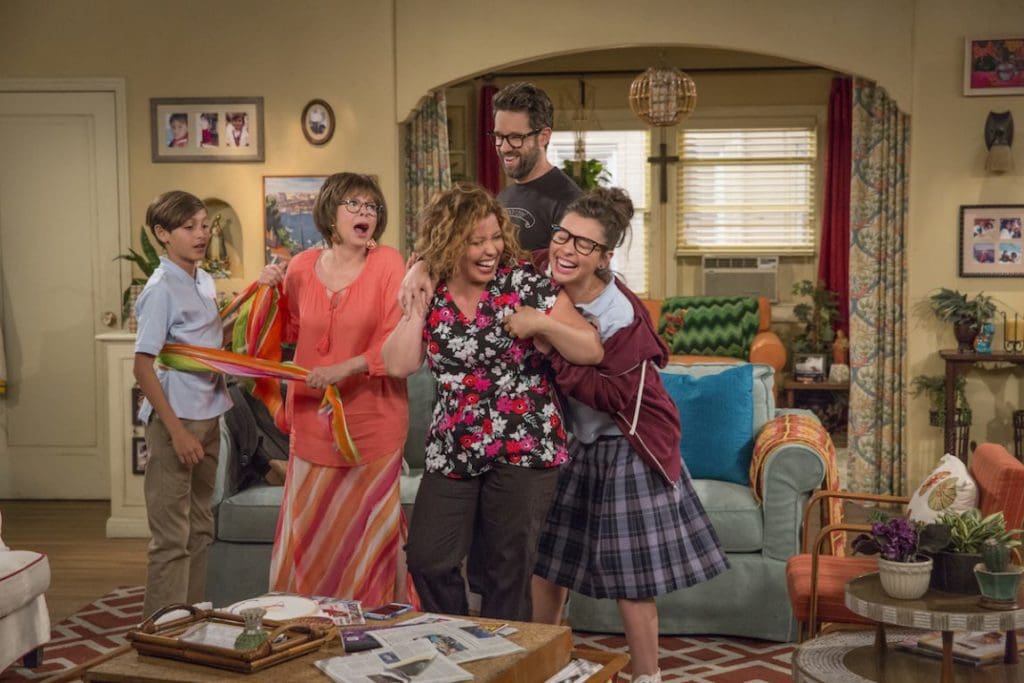
I’m going to let you in on a little secret: you’re missing out on a gem of a television series. Yes, I know, we’re in a Golden Age of TV, and there are just too many shows to keep track of. But, I promise, One Day at a Time is worth the watch. Even with an (admittedly annoying) laugh track, no show feels more relevant or worth your time in 2018.
Calling One Day at a Time a “throwback” would be appropriate since it is, of course, a remake of the classic sitcom of the same name. Norman Lear has updated his 1975 series for a modern audience, while maintaining it’s multi-camera format and old-school sense of humor. But while the tone might feel traditional, this version of One Day a Time embraces the progress that has been made since the 1970s and finds the Cuban-American Alvarez family standing in for the Coopers, with their own handful of relevant issues to deal with.
This time around, single mother Penelope (Justina Machado) is a veteran stricken with PTSD, who is trying to make ends meet while raising two teenagers. Those teenagers are also more modern alternatives to their former counterparts. There’s Elena (Isabella Gómez), a lesbian and aspiring political activist, as well as Alex (Marcel Ruiz), who is tech-savvy, sarcastic, and striving to be a good ally and support system in a house made up entirely of woman. This is truly a ‘modern family’, and the way the show subverts sitcom tropes to acknowledge how timely it is makes it worth raving about.
Take, for example, the second season premiere. “The Turn” begins like many classic sitcoms, with middle school student Alex acting up at home and getting in fights at school. As Penelope tries to figure out what is causing her son to act-out, the inevitable hijinks seen in dozens of sitcoms ensue. But then something interesting happens: it turns out that Alex has been experiencing racist bullying at school, which has made him angry and unsure of how to process the experiences.
Suddenly, this classic sitcom formula takes on a new, decidedly modern tone. The characters explore complicated subjects that are often difficult to talk about, including white privilege, colorism, intersectional social justice, and the way our current administration has made marginalized communities feel unsafe. And even as they explore dramatic subject matter, the series doesn’t abandon its comedic origins.
The season premiere is only the tip of the iceberg, however. Later episodes this season explore issues like mental health, immigration, and gender identity. One particularly effective episodes flashes back to 9/11, to show how that event affected the lives of military families all over the country. Another finds Elena struggling with the difficulties of being one of the few openly gay kids in her school, and ongoing subplots depict her budding romance with a nonbinary student, as well as her fractured relationship with her unaccepting father. Occasionally, the series bites off more than it can chew, as seen in a confusingly written and tonally uneven episode centered on gun control. But even when it is slightly off-target, the series talks about issues that are rarely discussed on television, let alone on a sitcom.
One day at a Time also has a secret weapon: EGOT Rita Moreno, who consistently kills it as Lydia, Penelope’s mother who helps her raise Elena and Alex. To say that Moreno steals every scene she’s in feels like an understatement; Lydia is series’ life-force, who is given all the best lines and some stunning dramatic material to work with. Moreno’s comedic timing is stellar, and she has the uncanny ability to sell even the cheesiest line (which, unfortunately, the show has quite a few of). But watch out, because Moreno is bound to make you cry at some point, whether she’s delivering a monologue about what it was like to flee Cuba for America, or expressing her fears about applying for citizenship to the United States. The fact that Moreno was snubbed at the Emmys for her seminal work on the series is outrageous.
With a second season now available for binging, One Day at a Time deserves the immediate attention of anybody looking for quality entertainment. Sure, it’s cheesy at times. But it’s a pleasant throwback to the family sitcoms that generations of comedy lovers were raised on – whether they watched The Fresh Prince, Family Ties, or even the original One Day at a Time. Even better: this sitcom is inclusive, progressive, and interested in starting a discussion amongst its viewers.
Overall rating: 8 out of 10.

